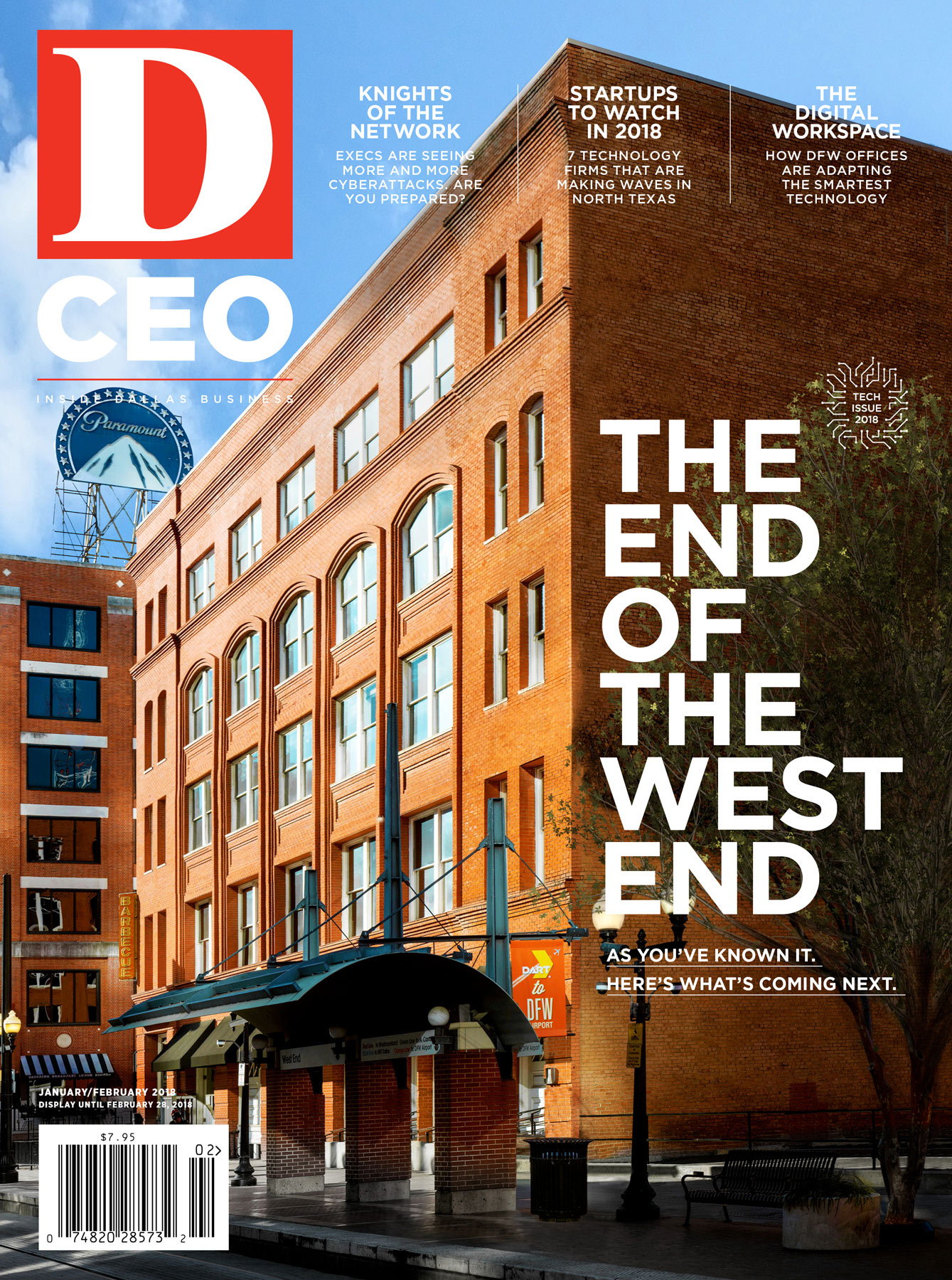The Dallas area’s most interesting young companies are changing everything about business. Some have created technology, while others leverage technology to operate so efficiently that they could reasonably get scooped up by Amazon or Google.
Here are seven of the region’s many bright startups.
Security On The Edge
After building and selling SoftLayer, the company that became IBM’s Bluemix cloud computing group, StackPath CEO Lance Crosby set out to create a new generation of secure, ultrafast cloud service.
StackPath, founded in 2015, has raised $180 million to date, most of it from Boston-based private equity firm Abry Partners. It purchased five companies in two years, each one providing a component of its security-as-a-service platform. StackPath is both a content delivery network and a cloud security specialist. Content and services running on its network are getting the internet-equivalent of an armored car escort to their destination, but at race-car speeds.
This is especially relevant now that distributed denial of service attacks, where lots of devices are hacked and simultaneously forced to send traffic to a single network address, have been used in recent months to take down major internet sites and core internet infrastructure. Crosby says his network uses machine learning to spot odd behavior and compare it with a giant database of known hacked endpoints to prevent infected devices from doing damage. “Our database has every single hacked PC or device in North America,” Crosby says. “When we see grandma’s computer attack Bank of America, and then attack Schlotzsky’s, and then the Ritz-Carlton … we know she’s got something inside her home that’s hacked.”
In the last 18 months, StackPath has increased its customer count from 50,000 to 800,000 and its revenues from $16 million to around $200 million. But its most significant opportunity yet is just up ahead.
Video content creators and providers are putting “everything they’ve ever aired … [on] the internet,” according to Crosby. That’s a massive target for hackers, he says. “If video … looks to be 80 percent by the end of 2018, the bad people of the world will figure out how to put viruses and malware into the video streams,” Crosby warns. “We think that’s going to be the No. 1 source of delivering malware.”
Hard And Soft Infrastructure
Big data and more video usage require more data centers. If data is the new electricity for businesses, Compass Datacenters is building tomorrow’s power plants. “We’re the least sexy side of the technology stack, but everything’s got to plug in somewhere,” CEO Chris Crosby says.
Crosby says Compass is succeeding by being quick, consistent, and innovative. It offers to pay customers $100,000 if it can’t deliver a data center six months after breaking ground. “We’re in an industry that typically builds everything custom,” Crosby says. “We’re not all things to all people … we’re very low-cost with high-quality features and just-in-time inventory.”
Compass, founded in 2011, has raised $170 million to date, according to Crunchbase. That includes an undisclosed sum in January 2017 from the Ontario Teachers Pension Plan and RedBird Capital Partners.
Cryptocurrency Is the New Green
Meanwhile, a new kind of infrastructure is being built by a small Dallas startup. Swirlds is making a distributed trust platform to mainstream cryptocurrency, a digital currency secured by cryptography.
Leemon Baird, Swirlds’ founder, invented a technology called Hashgraph, an alternative to blockchain, which is used to verify cryptocurrency transactions and smart contracts. Blockchain is a universally accessible digital ledger that keeps a running tabulation of transactions.
Long story short, Swirlds’ technology works faster than blockchain and can allow for distributed consensus without requiring a central server. “It takes about an hour to get a transaction put on a blockchain,” says Arlan Harris, COO of Swirlds. “We can do 300,000 transactions per second.”
The applications for the technology could include anything where security, permission, and timing are critical, like online auctions, stock market trades, or cryptocurrency transactions.
Keep an eye on Swirlds. It’s a small company with a big idea. It recently moved from College Station to Dallas and closed a $3 million seed round led by New Enterprise Associates, whose chairman was the first Apple investor.
Big Data vs. Cancer
Three-year-old Lantern Pharma is using big data and analytics to find cancer patients who will respond favorably to specific cancer drugs. The company uses molecular profiling to identify the particular patients who would respond positively to certain oncology drugs—treatments that otherwise might have been shelved because they don’t work for enough people to be a commercial success.
The company raised a $3.7 million Series A funding round last year. To date, it has one deal, worth about $20 million for one of the drugs in its pipeline, according to company founder Arun Asaithambi. The company’s next license deal, which should happen in 2018 or 2019, could be worth between $50 million and $100 million.
In a recent paper, Asaithambi wrote that drug rescue and repurposing in oncology is a potentially huge business inside of the broader market of precision medicines. That market, he estimates, could reach $88 billion in the next six years and “has the potential to impact all cancer patients.”
Also worth watching among DFW healthcare startups is Take Command Health, a smaller upstart that is using massive amounts of data from past healthcare claims and insurance providers to guide consumers to the right health plan. “Health insurance is insanely boring, and it’s hard to pay attention to,” says CEO Jack Hooper. “But it is now the now the second highest cost for individuals and small businesses, so now people are paying more attention.”
The company launched in 2014 and aimed its service at individuals and small businesses. For small businesses, Take Command provides a service that allows a company to reimburse its employees, tax-free, for medical expenses. Meanwhile, it helps employees find individual health plans.
According to Hooper, Take Command Health closed its second funding round in late 2017 with $1.7 million raised as of presstime. The company’s projected revenues for 2018 are between $500,000 and $600,000. It started helping small businesses in May and had about 80 clients as of October. The company is operating in eight states.
Simple Logistics
Selery Fulfillment gained notoriety by offering simplified, flat-rate pricing for a complex set of logistics services. The company claims it excels at packing and shipping, but its reputation has been built on its willingness to do everything else. “We’re a one-stop shop,” says CEO Justin White.
Even though it’s a fulfillment house, it can sell and ship items via Amazon, eBay, and other online merchants on its clients’ behalf. “We prep items for Amazon … We can book the freight for them. We do customer service for them … and we stand out because one-stop shops don’t really exist for entrepreneurs and smaller companies,” White says.
In May, the company raised $1 million in funding from investors including Mark Cuban and Deep Space Ventures. The three-year-old firm has raised $1.3 million in total to date and plans to raise more money in 2018.
White says the company’s revenue was up about 48 percent since its last funding round, putting its revenues well over $1 million a year. “In 2018, we’ll be working toward continued growth,” White says. “We’re not really spending any money on marketing, so we want to crank that up, too.”
Finally, the internet has solved the need for people to ask to borrow their friend’s truck. Dallas-based PICKUP hauls items that are more than 50 pounds for less than 50 miles and can be summoned by a smartphone app, their website, an email, or an old-fashioned phone call. “Retailers spend all of their money on the logistics to get merchandise to their stores, and no one seems to be in charge of getting those purchases from the store,” PICKUP CEO Brenda Stoner says.
Founded in 2014, PICKUP has raised $2.5 million to date and now operates in seven Texas cities. Expansion to other states is planned for 2018, Stoner says.
Phil Harvey is a technology industry writer and editor based in Fort Worth.






